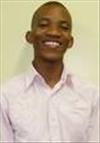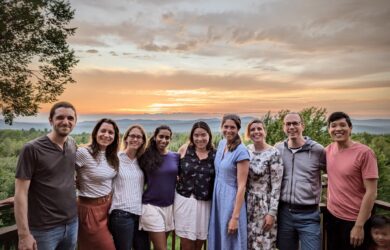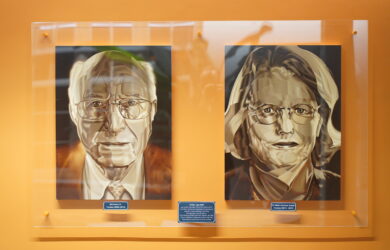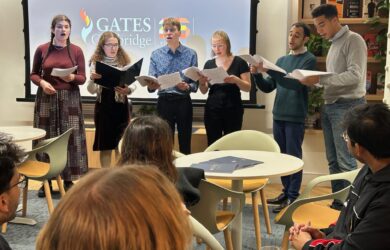He says the rigorous assessment process for the prize at the University of KwaZulu-Natal relied on detailed student feedback as well as other information. "It's such a validation," says Thabo, who was promoted to associate professor of education recently. His main focus is on inclusion and discrimination. He teaches undergraduates and postgraduates and supervises PhD students. He also teaches on the compulsory human rights course at his university which includes a section on sexual rights.
"I see teachers as collaborators in the process of learning and being there to learn themselves. It is exciting to be at the forefront of more open debates about issues of sexuality and diversity," he adds.
Thabo's work builds on his PhD at the University of Cambridge, where he was a Gates Cambridge Scholar.
He studied changing attitudes to masculinity in South Africa and also worked on a DVD about gender, homophobia and HIV/Aids to use in South African schools. The DVD came out in 2009 and Thabo's aim was to use it as a strategic tool for teaching about homosexuality in the classroom. He says the feedback has been very positive. "Wherever we show it people are so open to it. It shows there is real movement in how people are thinking about these issues," says Thabo.
Building on that work, he helped devise and deliver a training programme for teachers on same sex issues and diversity, covering, for instance, how teachers should deal with a homophobic incident in school professionally without allowing any religious beliefs to affect that.
Last year he ran a workshop with a colleague for those teaching trainee teachers in South African universities. Government officials attended and as a result Thabo is now involved in a wide-ranging project to ensure that every South African teacher is trained in diversity issues. He has also been appointed to a ministerial committee to work on reviewing textbooks in order to remove any discrimination and ensure texts are more inclusive. The post-apartheid South African constitution protects human rights including homophobia.
Thabo says that in the past there was a lot of resistance from some student teachers against training around same sex issues, but that increasingly students are far more inclusive. He anticipates, however, that there may be opposition from religious organisations in around three years' time when he helps to launch a training module for schools.
Thabo has also linked up with other academic specialisms, for instance, he was invited to speak on diversity by the theology department at the University of KwaZulu-Natal's Pietermaritzburg campus and he has broadened his focus on diversity to encompass decolonialisation. He says movements like RhodesMustFall have mostly targeted formerly white institutions. The University of KwaZulu-Natal is a merger of the formerly white University of Natal and the formerly black University of Durban Westville and Thabo is supervising a doctoral student who is interested in curriculum change and is looking at the damaging effect that apartheid and colonialism had on black institutions. "We have tended to follow a watered down version of the curriculum used at formerly white institutions which has been used to indoctrinate students. The debate on decolonialisation is also focused on those universities and I am asking my students how our institution should react to colonialism," says Thabo.
Background
To succeed in the world of education, Thabo has had to overcome some formidable barriers. Born in a small rural village called Ntabamhlophe in the KwaZulu-Natal province of South Africa, he was educated at a township school until he was 10. Very few children from South African townships go on to higher education – only 14% of young people go on to higher education, compared with 65% of whites.
Under the apartheid system, which ended in 1994 when Thabo was 10, white South African children received good quality schooling, while black children were given what was described as "Bantu education" which prepared them for the unskilled labour market. The legacy remains and the rural provinces like KwaZulu-Natal province present the greatest challenges, with township teachers often been poorly trained.
Thabo's family life has not been an easy one. His mother had to drop out of school when Thabo was born because she had to look after her father and wanted her children to have an education. She had to seek work far from home and would be gone for long periods of time. His father was studying to be a teacher so Thabo was brought up by his aunt for the first eight years.
When he was nine he moved in with his grandmother in the poorest section of a township near the town of Estcourt. His two younger sisters stayed with his aunt. From age 10, Thabo's parents were able to buy their own house in the township and in 1994 the whole family moved to Estcourt.
His mother was working long hours as a waitress so was not around much. His father considered it was not his job to look after the children. Thabo says traditionally the man of the house was treated as the master and even had his own special plate to eat from.
It fell to Thabo to take control of the household budget, clean the house and do the cooking. He attended high school in Estcourt and found it difficult to bring together his home life where he was treated as a traditional Zulu boy with the "middle class white life" of his school. He felt very different from his peers who came from wealthier backgrounds and was not allowed to invite any to his house.
Despite this and problems with gambling due to his unhappiness, Thabo managed to set up several ground-breaking initiatives at his school. He used his lunch money to go to his township to train children to play hockey. He founded the first debating league to bridge the gap between township and urban schools, seeing it as a way of building township children's fluency in English. "It was the first league to include different races," he says.
With support from teachers and the school cashier, he was accepted to the University of KwaZulu-Natal to study education. There he set up the Community Development Association, a widening participation initiative aimed at bringing secondary school students from township schools to the University of KwaZulu-Natal for a week to learn leadership skills.
Thabo also founded another debating league. His teaching course was four years long, with a focus on social justice. During it, he won several scholarships, including a Fulbright scholarship to study anthropology at Columbia University's Teachers College, later switching to international education development and from there applied to the University of Cambridge.
He says he is very grateful to Gates Cambridge as he would not have been able to study at the University of Cambridge without the scholarship. The PhD was a turning point in his career, but he says the thread of social justice has run throughout his life. "Social justice is my passion," he says. "Every project I get involved in has to be about empowering people and challenging assumptions about race and gender."














